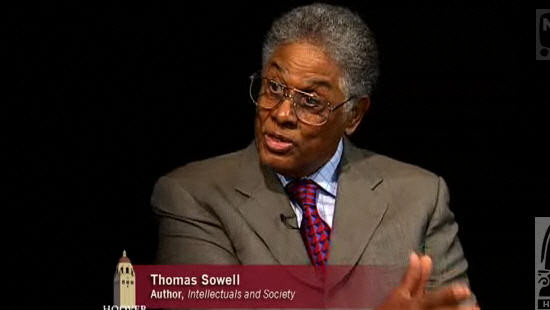 Thomas Sowell: the strongest critic a program meant to help members of his race?
Thomas Sowell: the strongest critic a program meant to help members of his race?
Last week, The New Yorker published a review of the new book describing the Obama marriage, Barack and Michelle: Portrait of an American Marriage. In true New Yorker fashion, author David Remnick produced a voluminous piece of esoteric aggrandizement, cobbling together five pages of irrelevant narratives and Oval Office anecdotes in an effort to applaud the President and First Lady. A read through the cumbersome and longwinded article reveals that under the auspices of writing a review, Remnick birthed a heinous heap of pro-Obama grandstanding that reeks of unabashed liberal partiality. Like much of what The New Yorker excretes, this is an article to be avoided at all costs.
Or is it?
Buried within this convoluted mass of unfounded admiration lies one excerpt of particular interest. While exploring the state of the Obamas’ personal life, Remnick describes the first couple’s well-educated and distinguished African-American friends. After introducing a series of prominent doctors, attorneys, executives, and legislators, the author observes that in spite of their immense success, they still “talk about how African-Americans of their class and generation feel the weight of race most acutely in relation to affirmative action, sensing that whites often think they have not truly earned their place at Harvard or Princeton or on the medical faculty.”
“How horrible!” Remnick wails; they’re bosom buddies with the President of the United States, leader of the free world, and they still have to shoulder this fundamental insecurity! Something is clearly wrong here! And with that bit of throwaway analysis, the author retreats from the uncomfortable subject of race relations and back to his unbroken string of praise for the First Family. But, despite the inconsequence of Remnick’s discussion, the anecdote reveals something of immense weight; in alluding to the unintentional effects of racial favoritism, it unequivocally verifies what critics of affirmative action have said from the beginning.
In the debate over affirmative action, there is an unfortunate tendency to argue across purposes. Any discussion of racial preference presents two issues. The first is the moral worth of what the policy hopes to do. In other words, are its intentions agreeable to such a degree that the policy is worthy of implementation? It is this contention that supporters dwell on, for who wouldn’t want to promote racial equality in modern society? The second is the righteousness of the processes it sets in motion. Can we implement this policy’s intention in an efficacious and equitable way? It is in this second question that the true political question lies, yet liberals seem unwilling to engage at this level. Instead, they chose to focus exclusively on the first issue, calling anyone who objects to affirmative action “racist anachronisms” for failing to legislate equality. This tactic not only confuses the issue, but it also fails to address the primary problem with affirmative action, namely its potential for inequity.
As much as supporters clamor about the inherent morality of supporting disadvantaged social groups, affirmative action is and will always be a failed doctrine for one simple reason; it is one immense self-contradiction. At its very heart, affirmative action attempts to promote racial equality by institutionalizing inequality in academia, the workforce, and all levels of society. Under the standard of righting centuries of wrongdoings and opening avenues of success to the disenfranchised, liberals have birthed a system that enables the government to assign privilege to certain groups based on race and race alone. Inherent within this designation is a dichotomy that perpetuates racial self-consciousness and tension. When the government is allowed to elevate the interests of one demographic over that of another, equality cannot possibly exist. Instead, a heightened sense race consciousness pervades society, prohibiting progress and undermining the program’s original intent. It is in this way that affirmative action promotes self-defeating processes that more than erase the nobility of the policy’s intent. As The New Yorker illustrates, not even a degree from Harvard or friends in the Oval Office can fix that.
–Nick Desatnick

Be the first to comment on "Affirmative Action Promotes Inequality"